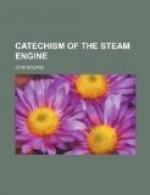A..—It appears probable, that by working a common reciprocating pump at a high speed, a continuous flow of water might be maintained through the pipes in such a way as to render the existence of any valves superfluous after once the action was begun, the momentum of the moving water acting in fact as valves. The centrifugal pump, however, threatens to supersede pumps of every other kind; and if the centrifugal pump be employed there will be no necessity for pump valves at all. There is less loss of effect by the centrifugal pump than by the common pump.
432. Q.—What is the best form of the centrifugal pump?
A.—There are two forms in which the centrifugal pump may be applied to mines;—that in which the arms diverge from the bottom, like the letter V; and that in which revolving arms are set in a tight case near the bottom of the mine, and are turned by a shaft from the surface. Such pumps both draw and force; and either by arranging them in a succession of lifts in the shaft of the mine, or otherwise, the water may be drawn without inconvenience from any depth. The introduction of the centrifugal pump would obviously extinguish the single acting engine, as rotative engines working at a high speed would be the most appropriate form of engine where the centrifugal pump was employed.
433. Q.—This would not be a heavy deprivation?
A.—The single acting engine is a remnant of engineering barbarism which must now be superseded by more compendious contrivances. The Cornish engines, though rudely manufactured, are very expensive in production, as a large engine does but little work; whereas by employing a smaller engine, moving with a high speed, the dimensions may be so far diminished that the most refined machinery may be obtained at less than the present cost.
434. Q.—Are not the Cornish engines more economical in fuel than other engines?
A.—It is a mistake to suppose that there is any peculiar virtue in the existing form of Cornish engine to make it economical in fuel, or that a less lethargic engine would necessarily be less efficient. The large duty of the engines in Cornwall is traceable to the large employment of the principle of expansion, and to a few other causes which may be made of quite as decisive efficacy in smaller engines working with a quicker speed; and there is therefore no argument in the performance of the present engines against the proposed substitution.
VARIOUS FORMS OF MARINE ENGINES.
435. Q.—What species of paddle engine do you consider to be the best?
A.—The oscillating engine.
436. Q.—Will you explain the grounds of that preference?




